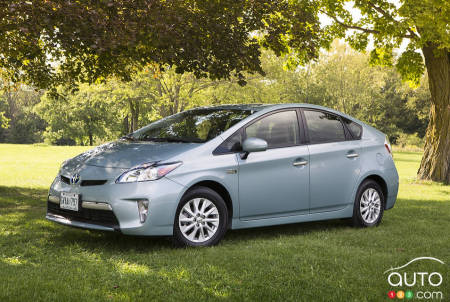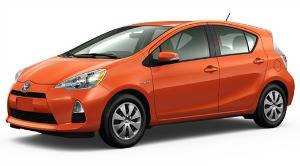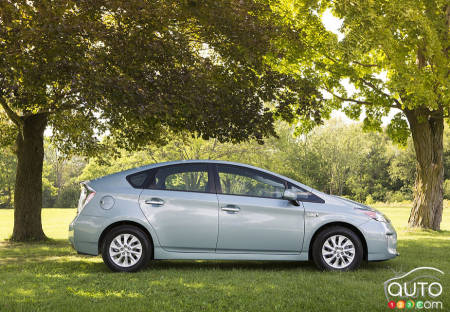
The 2013 Prius Plug-In Hybrid | Photo: Toyota
It slipped…
The Prius is another staple household name that Toyota has successfully imprinted on North America’s (read: the world’s) psyche. The moment the name is heard hybrid comes to mind, much like a tissue is a Kleenex, and an icebox a Fridge.
The Toyota Prius is the benchmark dedicated hybrid vehicle or at least, it was. The advent of full EVs, numerous hybrid cars from other manufacturers, and variations on both themes have left the almighty Prius somewhat squeamish.
As a whole, the 2013 Toyota Prius Plug-In Hybrid is quite good at what it does. Its drive, roomy cabin, and quick charging time all work heavily in its favour. However, in a time and place where design and appeal weigh heavily on consumer’s minds, the Prius slips behind a number of its latest competitors.
What is a Toyota Prius Plug-In Hybrid?
The Prius was Toyota’s first foray into the then unknown and untested waters of the world of hybrid technology. It became an overnight success and solidified Japan’s No. 1 carmaker’s dedication to the hybrid powertrain.
The 2013 Toyota Prius Plug-In Hybrid is currently the ultimate iteration of this popular car. How popular? Nearly 3 million Prii have been sold worldwide to date.
The present third-generation Prius arrived for the 2010 model year and was joined by the Prius c and Prius v in the last 2 years.
Technicalities
The 2013 Prius Plug-In Hybrid is motivated by an Atkinson Cycle 1.8 L 4-Cylinder engine coupled to Toyota’s Hybrid Synergy Drive (HSD). The latter consists of an electric motor mated to a CVT ‘box and an advanced Lithium-ion battery.
The combined output from the system is 134 hp. Standard features include electric power steering, a 3-hour full-charge time and a 22 km full-electric range.
The base 2013 Toyota Prius Plug-In Hybrid has a sticker price of $35,700. The Technology package adds $5,235.
Driving the Toyota Prius Plug-In Hybrid
As with every other hybrid, Plug-In or not, careful and precise modulation of the throttle is in order to maximize the use of the battery’s charge. This action also plays an important role on range.
With a strong charge, the 2013 Toyota Prius Plug-In Hybrid will travel to roughly 100 km/h on electric power alone. The Prius prefers being utilized as an urban mode of transportation as this is where battery life is fully optimized thanks in part to regenerative braking. Maintaining highway speeds for even a short time will quickly deplete any remaining charge.
The Prius Plug-In Hybrid drives efficiently and seamlessly. Between sources of forward momentum, little to no lag or hesitation is present. Then again, Toyota’s had 15 years to get it right.
The 2013 Toyota Prius Plug-In Hybrid features three drive modes (EV, ECO, Power). The EV mode is automatically engaged when the battery is fully charged. It can be defeated through throttle pressure or the use of the console buttons. I found Power to be best for highway merging and passing; it is, however, battery murder.
I was able to briefly drive a 2013 Ford Fusion Energi and immediately noted an important difference in throttle response; the Fusion reacted (in full EV mode) more like a regular gas-powered car whereas the Prius’ powertrain is far more apathetic and resistant.
Proof that the 2013 Toyota Prius Plug-In Hybrid is destined for urbanity is its very short turning radius, along with an especially soft ride.
Inside and out of the Toyota Prius Plug-In Hybrid
The 2013 Toyota Prius Plug-In Hybrid’s styling is not likely to change drastically any time soon. The wedge shape (trendy these days) practically owes its status to this car.
The cabin is a hit-and-miss affair. The most unfortunate is the top and centrally mounted digital display that would look more at home in a mid-‘80s Subaru. The information on hand is certainly pertinent, but its presentation is not.
The rest of the dashboard is fine with plenty of buttons for those who love to fiddle around. I’m no fan of the textured plastics as they look as bad as they feel. The console’s waterfall shape allocates a large storage spot below it. The cabin is spacious and five adults can be seated is
Comparing the Toyota Prius Plug-In Hybrid
The 2013 Toyota Prius Plug-In Hybrid is a compelling piece of modern technology; however, the car’s attractiveness has lessened. Thankfully, it has a name, but beyond that it’s not as great as it should be.
The 2013 Ford Fusion Energi takes it to the cleaners on nearly every level. As time progresses, PHEV cars will multiply and likely outdo the Prius. I’m not concerned, as I’m certain the next Prius will reset the bar.
The Prius is another staple household name that Toyota has successfully imprinted on North America’s (read: the world’s) psyche. The moment the name is heard hybrid comes to mind, much like a tissue is a Kleenex, and an icebox a Fridge.
The Toyota Prius is the benchmark dedicated hybrid vehicle or at least, it was. The advent of full EVs, numerous hybrid cars from other manufacturers, and variations on both themes have left the almighty Prius somewhat squeamish.
As a whole, the 2013 Toyota Prius Plug-In Hybrid is quite good at what it does. Its drive, roomy cabin, and quick charging time all work heavily in its favour. However, in a time and place where design and appeal weigh heavily on consumer’s minds, the Prius slips behind a number of its latest competitors.
What is a Toyota Prius Plug-In Hybrid?
The Prius was Toyota’s first foray into the then unknown and untested waters of the world of hybrid technology. It became an overnight success and solidified Japan’s No. 1 carmaker’s dedication to the hybrid powertrain.
The 2013 Toyota Prius Plug-In Hybrid is currently the ultimate iteration of this popular car. How popular? Nearly 3 million Prii have been sold worldwide to date.
The present third-generation Prius arrived for the 2010 model year and was joined by the Prius c and Prius v in the last 2 years.
Technicalities
The 2013 Prius Plug-In Hybrid is motivated by an Atkinson Cycle 1.8 L 4-Cylinder engine coupled to Toyota’s Hybrid Synergy Drive (HSD). The latter consists of an electric motor mated to a CVT ‘box and an advanced Lithium-ion battery.
The combined output from the system is 134 hp. Standard features include electric power steering, a 3-hour full-charge time and a 22 km full-electric range.
The base 2013 Toyota Prius Plug-In Hybrid has a sticker price of $35,700. The Technology package adds $5,235.
Driving the Toyota Prius Plug-In Hybrid
As with every other hybrid, Plug-In or not, careful and precise modulation of the throttle is in order to maximize the use of the battery’s charge. This action also plays an important role on range.
With a strong charge, the 2013 Toyota Prius Plug-In Hybrid will travel to roughly 100 km/h on electric power alone. The Prius prefers being utilized as an urban mode of transportation as this is where battery life is fully optimized thanks in part to regenerative braking. Maintaining highway speeds for even a short time will quickly deplete any remaining charge.
The Prius Plug-In Hybrid drives efficiently and seamlessly. Between sources of forward momentum, little to no lag or hesitation is present. Then again, Toyota’s had 15 years to get it right.
The 2013 Toyota Prius Plug-In Hybrid features three drive modes (EV, ECO, Power). The EV mode is automatically engaged when the battery is fully charged. It can be defeated through throttle pressure or the use of the console buttons. I found Power to be best for highway merging and passing; it is, however, battery murder.
I was able to briefly drive a 2013 Ford Fusion Energi and immediately noted an important difference in throttle response; the Fusion reacted (in full EV mode) more like a regular gas-powered car whereas the Prius’ powertrain is far more apathetic and resistant.
Proof that the 2013 Toyota Prius Plug-In Hybrid is destined for urbanity is its very short turning radius, along with an especially soft ride.
Inside and out of the Toyota Prius Plug-In Hybrid
The 2013 Toyota Prius Plug-In Hybrid’s styling is not likely to change drastically any time soon. The wedge shape (trendy these days) practically owes its status to this car.
The cabin is a hit-and-miss affair. The most unfortunate is the top and centrally mounted digital display that would look more at home in a mid-‘80s Subaru. The information on hand is certainly pertinent, but its presentation is not.
The rest of the dashboard is fine with plenty of buttons for those who love to fiddle around. I’m no fan of the textured plastics as they look as bad as they feel. The console’s waterfall shape allocates a large storage spot below it. The cabin is spacious and five adults can be seated is
Comparing the Toyota Prius Plug-In Hybrid
The 2013 Toyota Prius Plug-In Hybrid is a compelling piece of modern technology; however, the car’s attractiveness has lessened. Thankfully, it has a name, but beyond that it’s not as great as it should be.
The 2013 Ford Fusion Energi takes it to the cleaners on nearly every level. As time progresses, PHEV cars will multiply and likely outdo the Prius. I’m not concerned, as I’m certain the next Prius will reset the bar.
Road Tests and Reviews
Experts
Consumers
2013 Toyota prius
Review Highlights
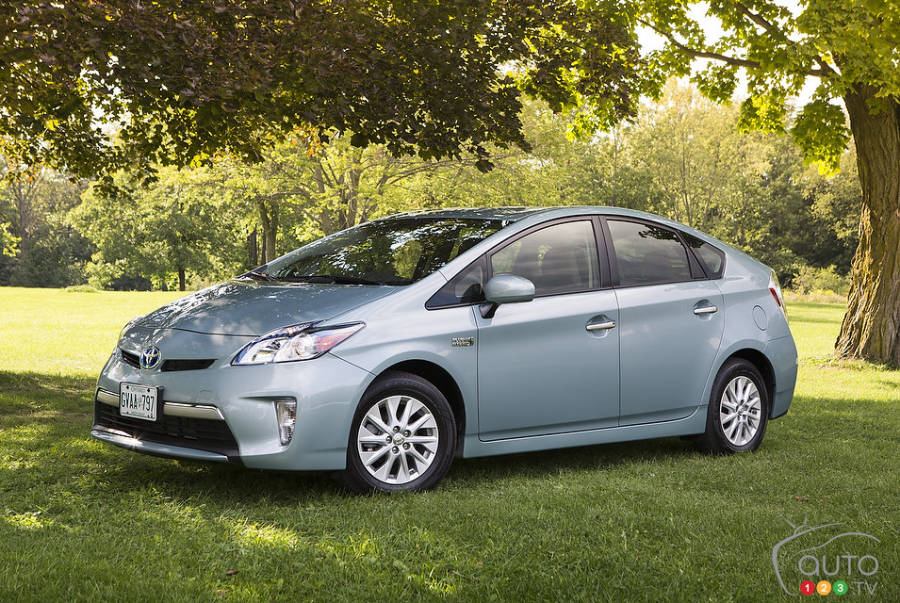
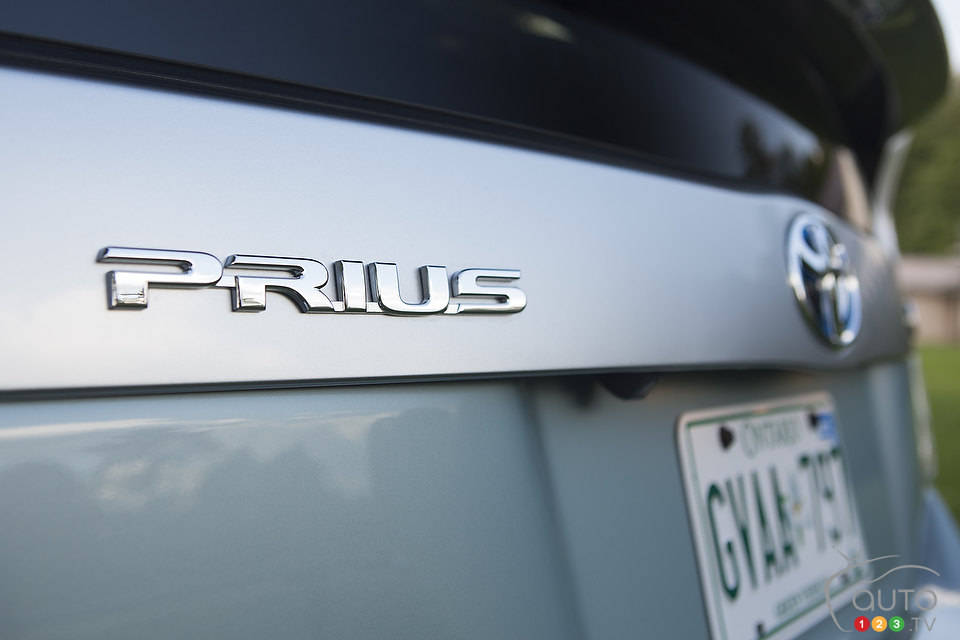
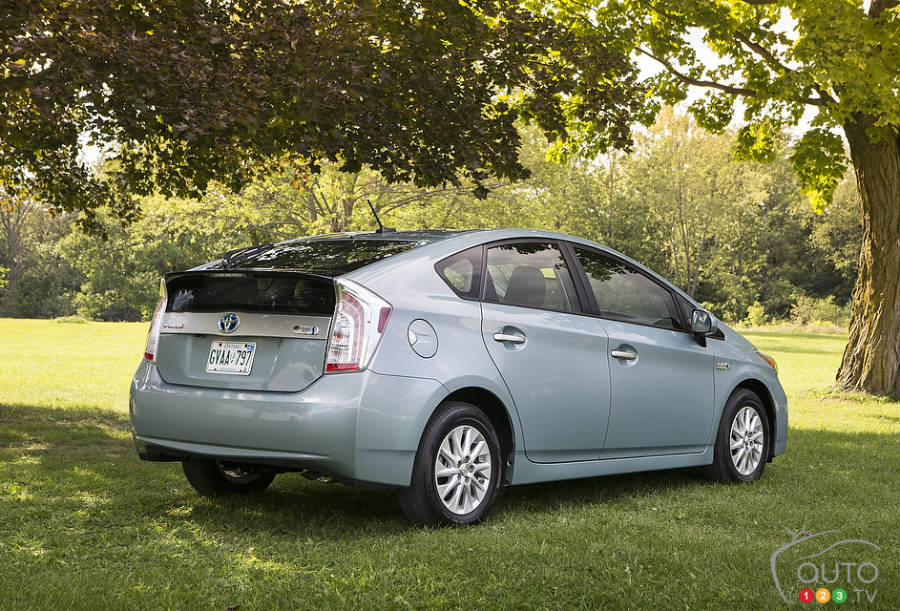
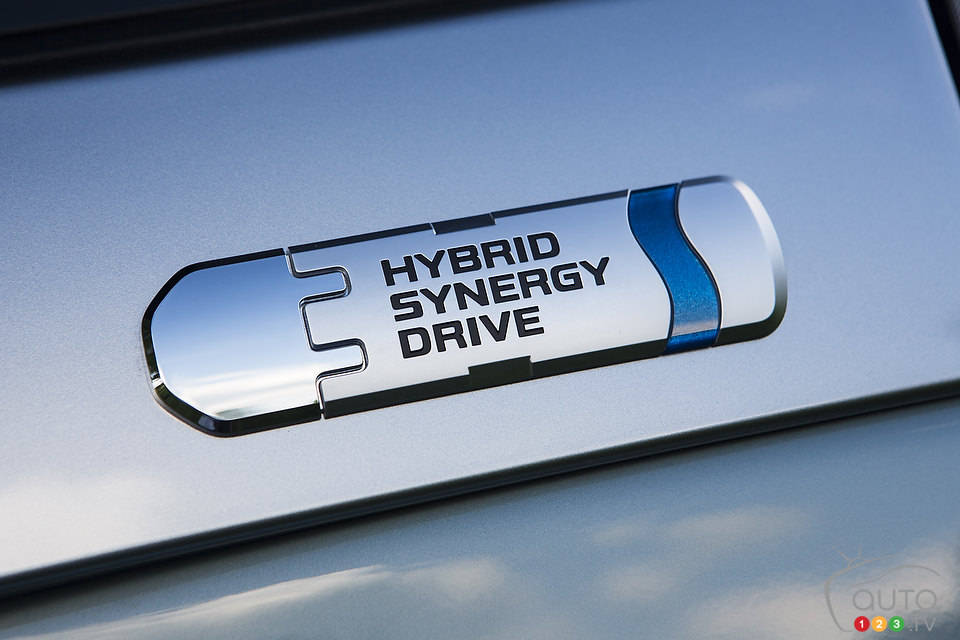
Article Gallery



